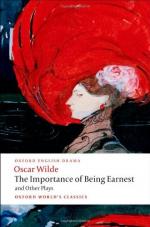|
This section contains 2,554 words (approx. 7 pages at 400 words per page) |

|
In the following essay, Jacobs examines Wilde's use of fantasy in exploring the question of cultural identity.
Though fantasy has been dismissed by many academics as a genre of marginal literary value, it attracts artists as well as readers. Indeed, one reason why a consensual definition of literary fantasy eludes us is that authors working in many genres draw upon it, smudging generic boundaries. Oscar Wilde was one of these writers.
Wilde appreciated the mind's power to make its own meanings, and he was skeptical of epistemologies, including his own. He used fantastic techniques, particularly those underscoring epis-temological questions, although for him problems of knowing the phenomenological world were less interesting than problems of understanding a literary text. Given the complex, irrational subjectivities of authors and readers, he argued, no literary work could be perfectly understood. Moreover, the ultimate inability of a reader to perceive an author's...
|
This section contains 2,554 words (approx. 7 pages at 400 words per page) |

|




